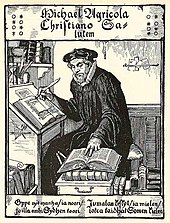
Back ميكايل أغريكولا Arabic ميكايل اجريكولا ARZ Мікаэль Агрыкала Byelorussian Мікаэль Агрыкала BE-X-OLD Mikael Agricola Breton Mikael Agricola Catalan Mikael Agricola Czech Mikael Agricola Danish Mikael Agricola German Mikael Agricola DIQ
This article needs additional citations for verification. (November 2018) |
The Right Reverend Mikael Agricola | |
|---|---|
| Bishop of Turku | |
 Drawing of Mikael Agricola by Albert Edelfelt (1854–1900). No contemporary depictions of Agricola have survived. | |
| Church | Church of Sweden |
| Diocese | Turku |
| In office | 1554–1557 |
| Predecessor | Martti Skytte |
| Successor | Petrus Follingius |
| Orders | |
| Ordination | 1531 |
| Consecration | 1554 by Botvid Sunesson |
| Personal details | |
| Born | c. 1510 |
| Died | 9 April 1557 (aged 46–47) Uusikirkko, Karelia, Sweden (now Russia) |
| Nationality | Finnish |
| Denomination | Lutheran |
| Part of a series on |
| Lutheranism |
|---|
 |
Mikael Agricola (Finnish: [ˈmikɑel ˈɑɡrikolɑ] ; c. 1510 – 9 April 1557) was a Finnish Lutheran clergyman who became the de facto founder of literary Finnish and a prominent proponent of the Protestant Reformation in Sweden, including Finland, which was a Swedish territory at the time. He is often called the "father of literary Finnish".
Agricola was consecrated as the bishop of Turku (Åbo) in 1554, without papal approval. He continued the reform of the Finnish church (then a part of the Church of Sweden) along Lutheran lines. He translated the New Testament into Finnish and also produced the prayer book and hymns used in Finland's new Lutheran Church. This work set the rules of orthography that are the basis of modern Finnish spelling. His thorough work is particularly remarkable in that he accomplished it in only three years.
He died of sudden illness while returning from a trip during which he assisted in negotiating the Treaty of Novgorod with the Tsardom of Russia.